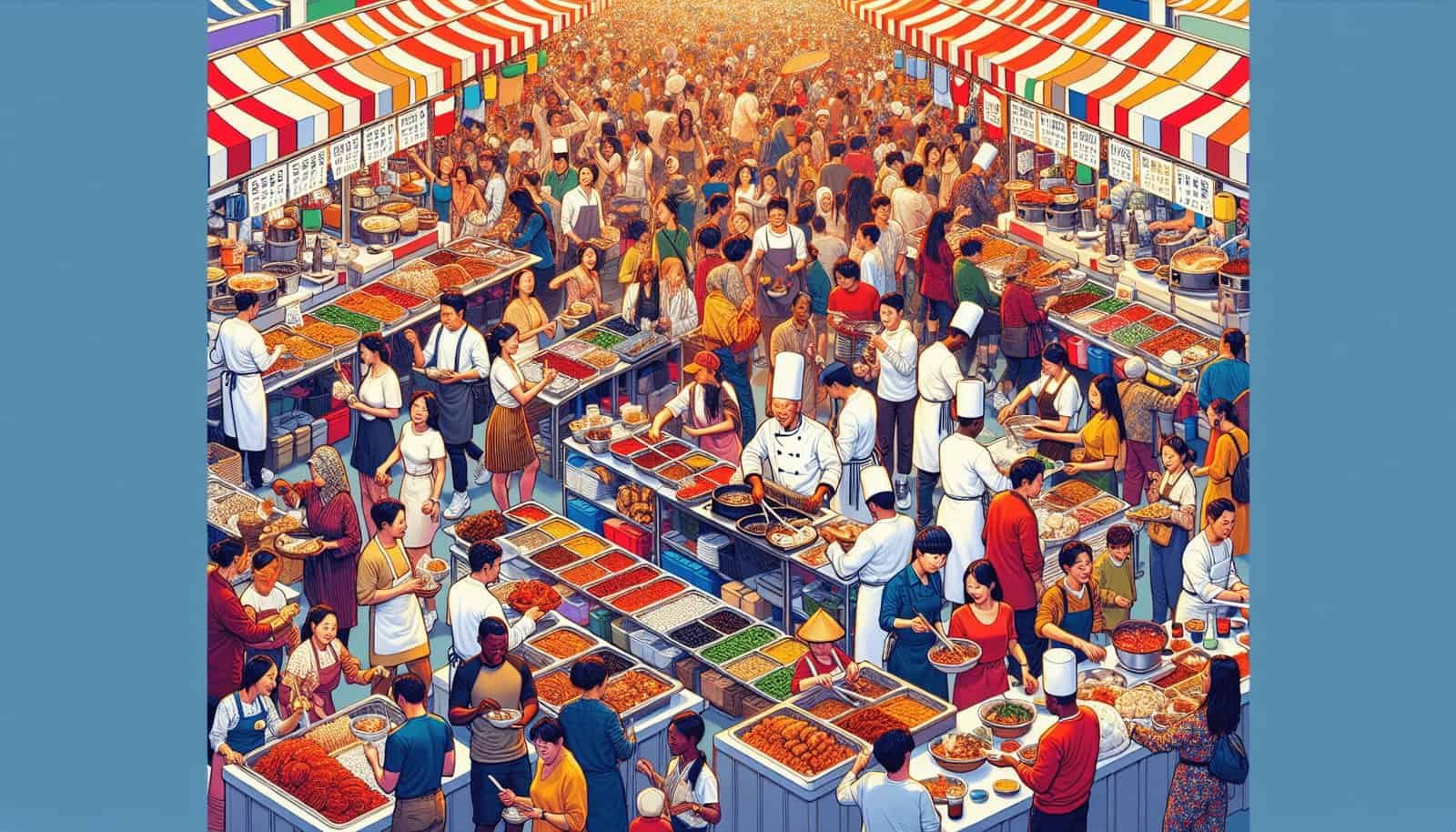Food festivals and events play a pivotal role in shaping Korean cooking trends, and you’ll be delighted to explore how. These vibrant gatherings are not just about sampling delicious dishes; they also serve as cultural hubs where culinary innovations get spotlighted and traditional recipes get a contemporary makeover. By attending these festivals, you immerse yourself in a dynamic culinary landscape, witnessing firsthand how chefs and food enthusiasts push the boundaries of Korean cuisine. This process of innovation, celebration, and sharing helps define and evolve the food trends that make Korean cuisine so globally beloved.
What Role Do Food Festivals and Events Play in Shaping Korean Cooking Trends?
Have you ever wondered how food festivals and events influence Korean cooking trends? As you delve into the world of Korean cuisine, you’ll discover that these vibrant celebrations play a significant role in introducing new ingredients, techniques, and dishes to both the local and international culinary scenes. Let’s take a closer look at how these events shape and inspire the trends in Korean cooking.

The Cultural Importance of Food in Korea
In Korea, food is more than just sustenance; it’s a central part of the culture and identity. Meals are often accompanied by ritual and tradition, creating a bond among people and generations. Food festivals and events become extensions of these traditions, serving as communal gatherings that celebrate and preserve Korea’s rich culinary heritage.
Historical Significance
From ancient times, seasonal festivals like Chuseok (Korean Thanksgiving) and Seollal (Lunar New Year) have been centered around food. These events consist of sharing elaborate meals that respect ancestors and signify the cycle of life. This historical significance lays the foundation for modern food festivals which continue to honor and promote traditional Korean dishes.
Contemporary Influence
In the current era, food festivals are more than just a nod to tradition. They serve as platforms for culinary innovation, where chefs and food producers showcase their newest creations. They also attract tourists, contributing to economic growth and fostering a greater appreciation of Korean cuisine worldwide.
The Role of Food Festivals in Shaping Trends
Food festivals and events are not merely about eating; they’re about exploration and education. They offer attendees an opportunity to explore new flavors, cooking techniques, and food concepts, which, in turn, affect cooking trends.
Promotion of Local Ingredients
Many food festivals emphasize the use of local ingredients, celebrating the unique produce and products of different regions. For example:
| Festival | Primary Focus | Location |
|---|---|---|
| Jeonju Bibimbap Festival | Showcasing the diverse ingredients and techniques of bibimbap | Jeonju |
| Yeosu Maturing Festival | Celebrating seafood, particularly maturing (fermented skate) | Yeosu |
| Nonsan Strawberry Festival | Highlighting the region’s strawberries through various culinary creations | Nonsan |
These events encourage chefs and home cooks to use local ingredients creatively, leading to trends that focus on regional specialties and seasonality.
Culinary Competitions
Competitions are a staple at many food festivals, offering chefs a platform to outperform their peers and experiment with new techniques. Winners often gain recognition and influence, paving the way for their innovative dishes to become trends.
Hands-on Workshops and Demonstrations
You’ll find that many festivals offer workshops and cooking demonstrations, giving participants hands-on experience with new cooking methods or unfamiliar ingredients. This not only elevates the attendees’ culinary skills but also spreads new techniques to a broader audience.
Celebrating Fusion and Experimentation
Korean food festivals are increasingly embracing fusion cuisine, blending traditional elements with foreign influences to create unique dishes. This trend reflects the globalized nature of modern society and the ever-evolving culinary landscape.
Fusion Food Highlights
For instance, dishes like Korean tacos or kimchi pizza have garnered significant attention at food festivals, showing how traditional Korean flavors can meld with other cuisines. These experimental dishes often become viral trends, appearing in restaurants and home kitchens worldwide.
Showcasing Young Talent
Modern food festivals also serve as launchpads for young, innovative chefs. These chefs bring fresh perspectives to traditional Korean dishes, contributing to the dynamic evolution of Korean cuisine. Their unique creations often become the next big trend in the culinary world.
Influence on Restaurant Menus
A particularly important aspect to consider is how food festivals impact restaurant menus. Restaurants often send scouts or chefs to these events to gain inspiration, which can lead to the introduction of new dishes on their menus.
Immediate Menu Changes
After a successful food festival, you might notice new items on restaurant menus. This could be anything from an innovative appetizer to a new twist on a classic dish, all inspired by what was showcased at the festival.
Long-term Shifts
Over time, the influence of food festivals can lead to more permanent shifts in restaurant offerings. For example, the increasing popularity of plant-based diets has been echoed in recent Korean food festivals, encouraging more restaurants to include vegetarian and vegan options in their menus.

Economic Benefits
Food festivals also have significant economic implications. They not only generate revenue through ticket sales and sponsorships but also provide a platform for small businesses and local farmers to showcase their products.
Boosting Local Economy
Local vendors gain exposure and business opportunities through these events. This boosts the local economy and encourages sustainable practices by keeping the focus on locally-sourced ingredients.
Tourism
Tourism is another key economic factor influenced by food festivals. International visitors flock to these events, boosting the hospitality and service industries. The international exposure also aids in promoting Korean cuisine globally, adding to its popularity and influence.
Enhancing Community and Cultural Exchange
One cannot underestimate the social benefits of food festivals. They provide a venue for people to gather, share, and celebrate. This communal aspect fosters a sense of unity and cultural pride.
Building Community
Food festivals act as community-building events. They bring together people from different walks of life, encouraging interaction and bonding over shared culinary experiences.
Cultural Exchange
Furthermore, these events often attract international attendees, promoting cultural exchange. Visitors gain firsthand experience of Korean culinary traditions, and vice versa, enriching the global culinary landscape.

Adapting to Modern Trends
As the world of food evolves, so do food festivals. They adapt to modern trends such as sustainability, health consciousness, and digital innovation.
Sustainability and Eco-friendly Practices
Modern food festivals emphasize sustainable practices. Efforts include reducing waste, using eco-friendly packaging, and promoting plant-based diets. These initiatives influence cooking trends by fostering a culture of sustainability within the culinary community.
Health-focused Trends
With a growing focus on health, many food festivals highlight nutritious and balanced diets. This has led to an increase in healthy Korean dishes, incorporating more vegetables and whole grains.
Digital Engagement
In the digital age, food festivals leverage social media and online platforms to reach wider audiences. Live streams, online workshops, and social media challenges make it easier for people to engage with the event, even if they cannot attend in person.
Case Studies: Popular Korean Food Festivals
To get a clearer picture, let’s look at some popular Korean food festivals and their impact on cooking trends.
Jeonju Bibimbap Festival
Jeonju is renowned for its bibimbap, a mixed rice dish that’s both delicious and visually stunning. The Jeonju Bibimbap Festival celebrates this dish and encourages chefs to present their unique takes on it. As a result, bibimbap has seen various modern adaptations, from vegan versions to globally inspired fusions.
K-Food Fair
The K-Food Fair, held in different international locations, aims to promote Korean cuisine globally. It’s a melting pot of traditional and modern Korean dishes, introducing international audiences to the richness of Korean food culture. This has significantly boosted the global popularity of Korean foods like kimchi, bulgogi, and Korean BBQ.
Gwangju World Kimchi Festival
Kimchi, a staple in Korean cuisine, gets its own festival in Gwangju. This event showcases the versatility of kimchi, encouraging innovations and modern twists while preserving traditional recipes. It also boosts awareness and appreciation of this iconic Korean dish internationally.
Seoul Gourmet
Seoul Gourmet is a high-profile event that attracts top chefs from around the world. It serves as a platform for culinary exchange, introducing global chefs to Korean ingredients and techniques. This cross-cultural interaction often results in fusion dishes that blend Korean flavors with global cuisines, setting new trends in both Korean and international culinary scenes.

Conclusion
So, what role do food festivals and events play in shaping Korean cooking trends? They are pivotal in promoting local ingredients, encouraging culinary creativity, fostering economic growth, enhancing community bonds, and keeping Korea’s culinary traditions alive while allowing room for innovation. These festivals act as a melting pot where tradition meets modernity, shaping the future of Korean cuisine in myriad ways. Next time you attend a food festival, remember, you’re not just enjoying a meal—you’re partaking in a vibrant cultural exchange that influences cooking trends locally and globally.
By exploring the various facets of these events, you’ll gain a deeper appreciation for how Korean food evolves and continues to capture the hearts and palates of people around the world. So, why not grab a ticket to the next food festival and see these trends in action for yourself?
